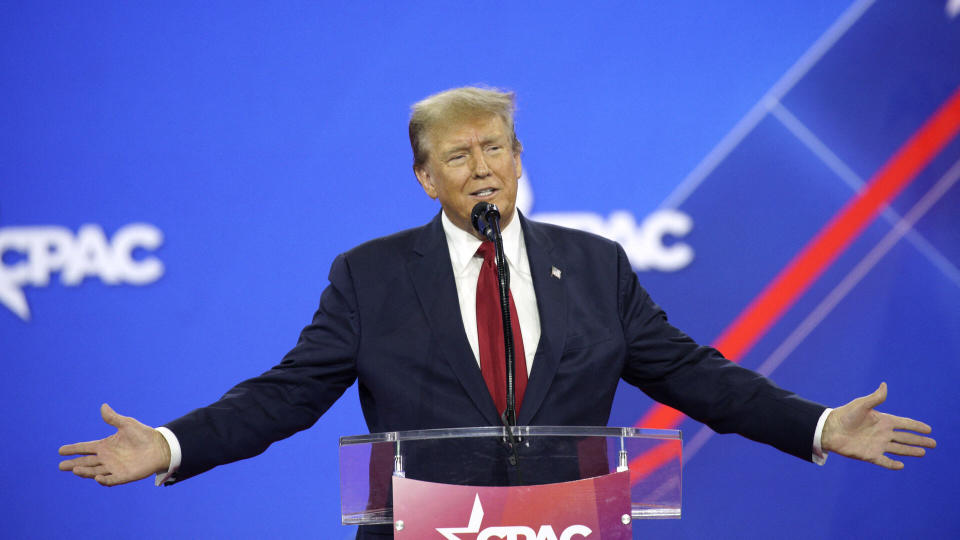4 Ways Biden/Trump Is To Blame for Inflation, According to Economists

Inflation remains a hot-button issue this election season, with nearly two-thirds (64%) of Americans considering it is “a very serious problem in the United States,” according to a recent YouGov survey.
Trump Wants To Eliminate Income Taxes: Here’s What That Would Mean for the Economy and Your Wallet
Also: 6 Unusual Ways To Make Extra Money (That Actually Work)
Both parties have been condemning the opposition’s actions and policies for high prices, which have been putting a strain on consumers’ wallets for many months.
While inflation has slowed — standing at 3% in June, down from 3.3% in May according to the Consumer Price Index (CPI) released July 11 — Americans continue to feel the pain, whether at the grocery store or when paying mortgages and rent.
During the June 27 presidential debate, Trump said Biden was the one who “caused the inflation.”
“He caused the inflation, and it’s killing black families and Hispanic families and just about everybody. It’s killing people. They can’t buy groceries anymore. They can’t,” he said, according to a transcript.
Meanwhile, Biden said Trump was to blame, as when he became president, “the economy was flat on its back. 15% unemployment, he decimated the economy, absolutely decimated the economy,” he said, according to the transcript.
Against this backdrop, here’s a look at reasons why both President Joe Biden and former President and Republican nominee Donald Trump are blamed for inflation.
Earning passive income doesn't need to be difficult. You can start this week.
Fiscal and Monetary Stimulus
According to Jason Sorens, senior fellow at the American Institute for Economic Research, while inflation was partly caused by supply chain problems during the pandemic and lockdowns, it was also partly a result of big fiscal and monetary stimulus and policies that reduced the economy’s productivity.
“Executive actions and legislation under Trump in 2020 poured at least $3.2 trillion extra into the economy,” said Sorens.
Sorens added that further stimulus under Biden in 2021 added another $1.9 trillion in deficit spending.
In turn, he said, the combined deficits for 2020 and 2021 were nearly $6 trillion.
“Then the Inflation Reduction Act (IRA) in 2022 added over $150 billion more to deficits. 2022 and 2023 saw a combined deficit of over $3 trillion, still well above average as a share of the economy,” he said.
And according to Professor Ernie Goss, PhD, Creighton University’s Heider College of Business and director of The Goss Institute for Economic Research think tank, Biden’s IRA did not, and will not, cut inflation — as GOBankingRates previously reported.
“And will in fact add to inflationary pressures and the national debt for years to come,” said Goss. “For example, tax credits for businesses in the bill will reduce tax collections and subsidize increases in EV [electric vehicles] production despite consumer resistance.”
Read: Effects of Inflation: Impacts on Everyday Life
Taxes Raised
Sorens argued that Biden raised taxes on businesses, including an alternative minimum tax and the end of equipment expensing in the year of purchase. Meanwhile, both Biden and Trump raised taxes on imports, potentially making supply chain problems worse and reducing the economy’s productivity, which economists say increases inflation.
“However, these tax increases were a secondary factor in inflation compared to the flood of stimulus money,” he said.
Fed Believed Inflation was “Transitory”
Meanwhile, the Federal Reserve cut the federal funds rate to zero and restarted quantitative easing. They also took too long to raise interest rates again, believing that inflation was “transitory,” said Sorens.
“You can blame the Fed more for inflation than anyone else because they could have offset all that deficit spending and didn’t,” he said. “But politicians also put them in a tough spot by spending so much.”
None are to Blame
Finally, some experts argued that neither is to blame for inflation and that the culprits are global events — such as the pandemic — which caused massive disruption in the supply chain and labor shortages, for instance.
In addition, geopolitical events are also partly to blame, some experts added.
“In my view, neither Trump nor Biden is to blame for the high inflation,” Mark Zandi, chief economist at Moody’s Analytics, told CNBC. “The blame goes to the pandemic and the Russian war in Ukraine.”
Anthony Termini, expert contributor for Annuity.org, echoed the sentiment, saying that neither Trump nor President Biden is the “root cause” of inflation.
“Lots of global events beyond either guy’s control were the catalysts for generally higher prices,” said Termini.
As he argued, inflation is a lagging indicator and low inflation under Trump was mostly the result of an economy growing slowly out of the 2008 economic crisis.
Meanwhile, high inflation at the beginning of Biden’s term was the hangover of supply disruption caused by the pandemic.
“However, prior to that, Trump’s import tariffs may have added to price pressure,” he said. “It is yet to be seen how President Biden’s budget decisions will affect future inflation, but the reality is that the federal deficit will likely expand in the next ten years and that will add to inflationary pressure.”
Editor’s note on election coverage: GOBankingRates is nonpartisan and strives to cover all aspects of the economy objectively and present balanced reports on politically focused finance stories. You can find more coverage of this topic on GOBankingRates.com.
More From GOBankingRates
This article originally appeared on GOBankingRates.com: 4 Ways Biden/Trump Is To Blame for Inflation, According to Economists